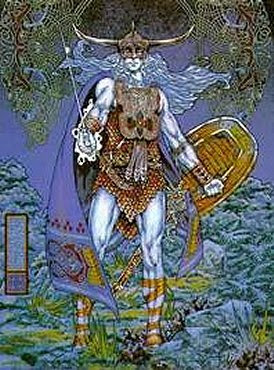
LUGA
(Pan-Celtic) [Loo] The Shining One; Sun God; God of War; "Many Skilled"; "Fair-Haired One"; "White or Shining"; a hero god. His feast is Lughnassadh, a harvest festival. Associated with ravens. His symbol was a white stag in Wales. Son of Cian and Ethniu. Lugh had a magic spear and rod-sling. One of his magic hounds was obtained from the sons of Tuirenn as part of the blood-fine for killing his father Cian. Also called Samhioldananach, meaning "master of all arts", or Lamhfada (La-VAH-dah), "the long-armed".
His sacred symbol was a spear. He was always accompanied by two ravens. Sometimes he is shown as one-eyed. Predecessor of the Germanic Wotan and the Norse Odin? He was a God of the sun, light, and the grain harvest, who is honored at the Sabbat of Lughnassadh. Like Brid, he is a deity of many skills and was even said to be able to come into human form to worship among the Druids for whom he was a primary deity. He is also worshipped as the God of fire, metallurgy, crafting, weaving, and as a protector of the weak.
Also known as Lugh of the Long Arm. He killed his grandfather, Balor, during a battle in which the new order of gods and goddesses took over from the primal gods. He defeated his enemies with a magic spear. Also known as Lug Samildanach or Lug.
Considered the chief Lord of the Tuatha De Danaan, the Celtic Zeus. His archetype appears to derive from an early solar deity, and he has many epithets and sobriquets, among which: Lamhfhada, Long-arm, referring to his skill with spear or sling; Samildanach, much-skilled, having many talents; Ildanach, seer; and Maicnia, boy-warrior.
Some scholars believe he was originally a king of the Fomorians who was adopted by the Tuatha De Danann and then by the Celts. He sided with the Tuatha in the Second Battle of Tireadh (Moytura) and led their forces against the Formorians. It was here that he killed his grandfather Balor, a sacrificial God whom Lugh was destined to replace. Though he was a divine being, he was said to have an earthly father. Because of this association, he is seen as a bridge between human and the divine worlds.
More statues and holy sites were erected to him than any other Celtic deity, and many of these sites remain for us today. His continental name was Lugus. He is often equated with the Greek God Apollo.
Also: Llugh; Luga; Lamhfada [lavada - of the Long Arm]; Llew; Lug; Lugus; Lug Samildanach (many skilled); Lleu Llaw Gyffes ("bright one of the skillful hand"); Lleu; Lugos
Lugh "the shining one" is the God of Light and the harvest. The festival, Lughnasa, is held in his honor in August, which is his sacred month. Lugh is seen as a God of Triplicity; as passionate Youth, wise King and Sage Elder. He embodies the Male dualities of Fire and Air. He is the Sacrificed God and is Protector and Defender. He is handsome, perpetually youthful, and has tremendous energy and vitality. This energy manifests itself especially in his many skills. He is known as Ildánach, master of all arts and crafts.
According to Celtic mythology, Lugh is the son of Cian and Ethlinn. The underworld god Balor was his grandfather. Balor was the leader of the Fomorii. The Fomorii were evil people that lived in the underworld. According to a prophecy, Balor was to be killed by a grandson. To prevent the happening of the prophecy, Balor tried to kill his grandson, but Lugh miraculously survived. Lugh was secretly raised by the god of the sea ,Manannan, and became an expert warrior. When he reached manhood, he joined the peoples of the goddess Dana, named the Tuatha De Danaan, (the term for the gods and goddesses who descended from the goddess Danu) to help them in their struggle against the Fomorii and Balor. Balor had an evil eye capable of killing whomever looked at it. Lugh threw a magic stone ball into Balor's eye, and killed Balor. After the god Nuada was killed in the Second Battle of Magh Tuiredh, Lugh became the leader of the Tuatha De Danaan.
Lugh corresponds to the Welsh god Lleu and the Gallic Lugos. Fertility magic during this festival ensured ripening of the crops and good harvest. He was called Lamfhada or 'of the long arm' in Gaelic because of his great spear and sling. His animal attributes were the raven and the lynx. Lugh mirrors Hindu Karttikeya, the spiritual warrior, and Roman Mercury, the swift messenger.
Lugh is known as a defender of the people, especially those who may be threatened by the forces of Nature. Lugh's Spear is the flash of Light which pierces the Darkness. He is Energy. A Sun God and God of the Sky and of Lightening, as well as of Death and Rebirth. He is Mage, Alchemist and Sorcerer.
Lugh teaches us not to fight battles out of anger, but to fight for causes that are just and right. He teaches us to honour our promises and our oaths.
Lord Lugh, Wise Warrior
My Protector and Defender
You guide my hands and
enlighten my thoughts
Oh Noble King
You have opened my eyes and my mind
You are the Light that guides my way
I am in Your service
Blessed Be
Song of Lughnasadh
I am the sovereign splendor of creation
I am the fountain and the courts of bliss
I am the bright surrender of the willpower
I am the watchful guardian and the kiss
I am the many-coloured landscape
I am the transmigration of the geese
I am the burnished glory of the breastplate
I am the harbour where all strivings cease.
Written by Caitlin Matthews
Resources:
Shee-Eire
Windows to the Universe
Kindle the Fire
Taryn Shrigley-Wightman
Celtic Connection
No comments:
Post a Comment